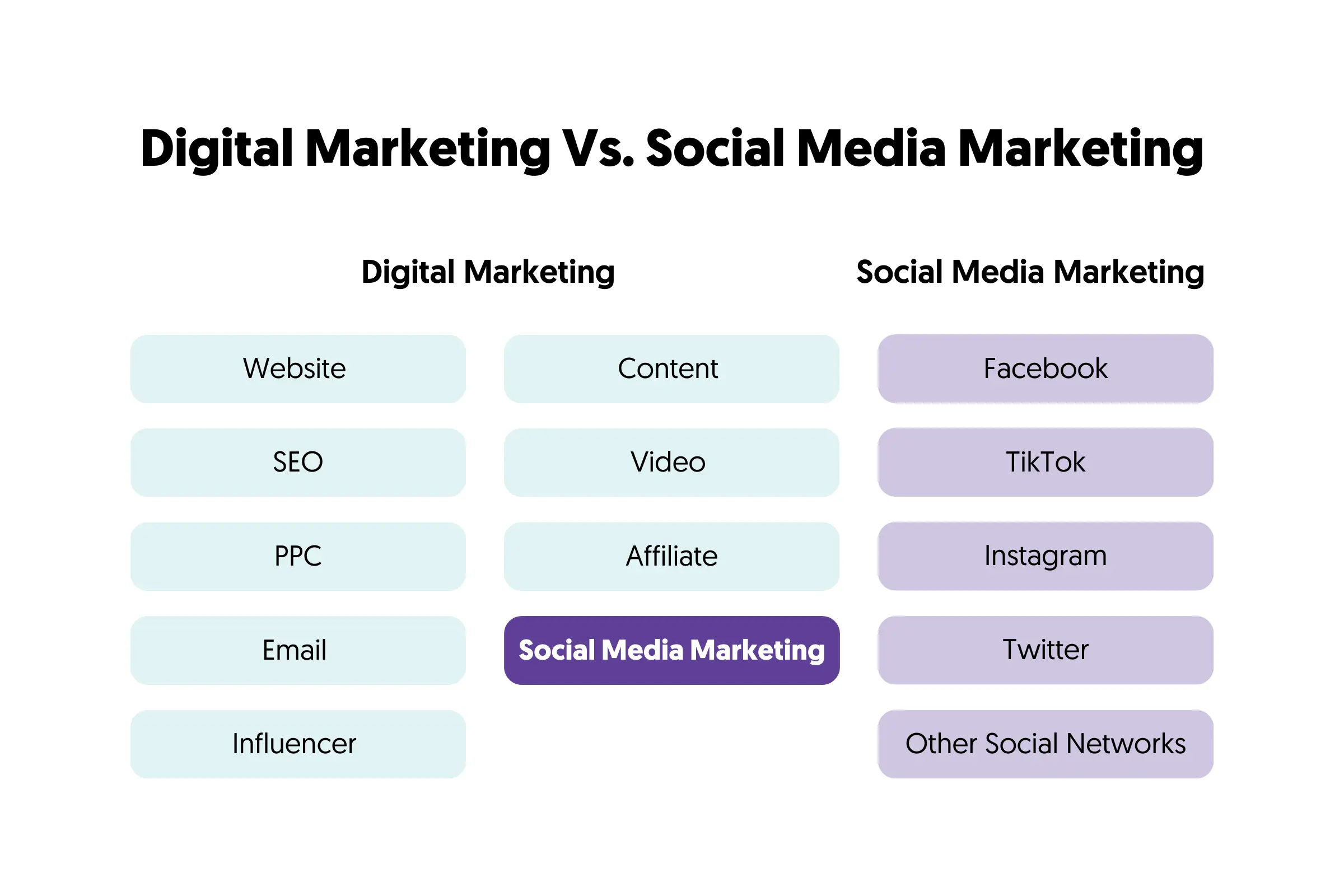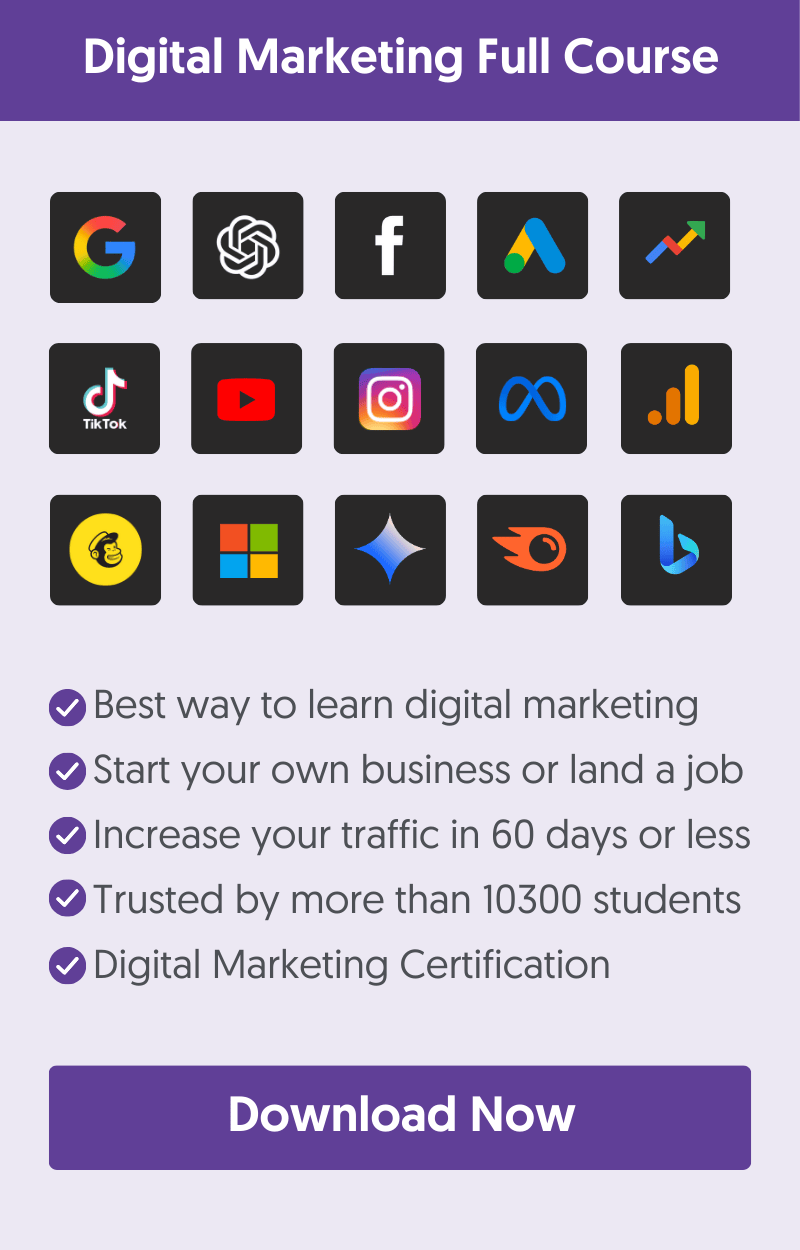Digital Marketing Vs. Social Media Marketing
Digital marketing is a form of marketing utilizing online and offline digital platforms, while social media marketing is marketing on different social media networks and forums, carried out solely online.
Social media marketing is one of the channels you can use in your digital marketing strategy. Many people believe that by engaging on social media, they are doing digital marketing, but this is not 100% true. There are many more channels to utilize in a digital marketing campaign.
The key differences between the two are:
- Digital marketing goes beyond the Internet and tries to reach people offline using digital means, while social media is limited to the boundaries of the Internet.
- A digital marketing strategy may include one or more channels (SEO, Content Marketing, etc.), while a social media marketing strategy may include one or more social media platforms (Facebook, Twitter, TikTok, Instagram, etc.)
- Social media is strongly associated with a content strategy, i.e., you create content and use social media to promote it, while digital marketing can rely entirely on banners (either on the Internet, TV, or billboards) for promotion.

What Is Digital Marketing?
is the marketing process of building awareness and promoting a brand or product online using all available digital channels.
The major components of digital marketing are:
- Online Marketing Channels – Website marketing, search engine marketing, SEO, PPC, email marketing, video marketing, influencer marketing, and social media marketing.
- Offline Digital Channels – Television, Radio, SMS, digital billboards (indoor and outdoor).
Here is an overview of how digital marketing works:
- Identify your target audience
- Set digital marketing goals
- Create a digital marketing strategy
- Choose your digital marketing channels
- Start campaigns
- Monitor and measure results
Digital Marketing Pros
The most important benefits of digital marketing are:
Global Reach and Specific Targeting: Digital marketing allows you to reach a global audience more efficiently than traditional marketing. You can target specific demographics, interests, and behaviors, making your campaigns more effective.
Cost-Effective and Scalable: Compared to traditional advertising methods, digital marketing allows small businesses to compete with larger ones using cost-effective strategies like SEO and content marketing.
Measurable: With digital marketing, everything in a campaign is measurable and tracked. This allows for making data-driven decisions to adjust budgets and improve profitability.
Increase Customer Engagement: With digital marketing, you can engage with your audience through many channels, build brand loyalty, and keep your audience aware of your existence.
For more digital marketing pros, read the top benefits of digital marketing.
Digital Marketing Cons
The major disadvantages of using digital marketing are:
Constantly Changing Landscape: The digital marketing industry is always evolving, and to stay current, you need to invest in continuous learning and adaptation.
Competition and Costs: Online marketing has become extremely competitive. Standing out requires creative effort and unique strategies, translating to more time and money.
What Is Social Media Marketing?
Social media marketing is the process of promoting a product or service through various social media channels. Generally, there are two ways to perform a social media marketing campaign.
The first way is free and involves building followers, fans, or connections by sharing useful content, running contests, and engaging with your users.
The second way is through paid advertising. You can use Facebook ads, Google Ads, or Twitter ads to advertise your product or services on Facebook, Google, and Twitter, respectively.
Here is an overview of how social media marketing works:
- Identify your target audience
- Set social media marketing goals
- Choose your social media platforms
- Create a social media schedule
- Run and optimize paid campaigns
Social Media Marketing Pros
There are many advantages of using social media for marketing purposes:
It’s a Fast Way to Spread Your Message – If you have a big fan base, you can tweet or post on Facebook, and your message can instantly go to thousands of users around the World. Social media is the fastest way (even from TV and Radio) to make an announcement or spread a message.
It’s Good For SEO – There are more and more signs that social signals are indirectly used for ranking purposes by both Google and Bing.
It’s a Trend – Social media is a trend you cannot ignore if you want to stay close to your customers and in synch with the latest developments in marketing.
It’s One of the Ways to Interact With Your Customers – With social media marketing, your customers can show that they like a product or piece of content by voting (Liking, commenting, and sharing). As a marketer, you can analyze these statistics, talk with your customers, and discover how to improve your products, content, or services.
For more social media marketing pros, read the top benefits of social media marketing.
Social Media Marketing Cons
The drawbacks of social media marketing are:
Requires Continous Effort: Social media marketing requires regularly creating and posting content, which can be time-consuming and costly.
Requires Expert Knowledge: Running effective paid ads on various social media platforms requires a deep understanding of how those platforms work, which requires investing in building your skills or hiring experts.
Social Media Trends Change Quickly: What works today might not work tomorrow, requiring marketers to update their strategies constantly.
Potential for Negative Publicity: Managing a brand’s reputation on social media platforms requires careful monitoring to avoid negative publicity.
Digital Marketing Or Social Media Marketing? Which Is Better?
It depends on the type of brand, products, or services you want to promote. There are cases where other forms of digital marketing will be more appropriate to build awareness than social media marketing. Social media is necessary for every product, brand, or service with a broad audience.
For example, suppose you are selling a software product. In that case, social media can help you find new customers, educate your existing customers (by sending them tips and tricks), and keep them informed about new updates, upcoming releases, etc.
If, on the other hand, you are selling custom tools for farmers, you can use social media as a resource to find out more about the products, but your main selling point will be billboard ads in rural areas and Radio ads.



